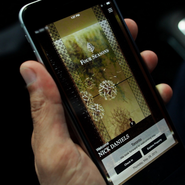 Four Seasons mobile app
Four Seasons mobile app
The travel industry is having difficulty convincing consumers that it can use personal data effectively and responsibly, according to a new survey from Boxever.
According to respondents surveyed for "Roadblocks to the Connected Consumer," only 27 percent of consumers think the travel industry can use their data to improve customer experience, compared to the 49 percent that think retailers will and 72 percent that think Google knows their preferences and interests. Consumer reticence stems from ineffective advertising but is more muted among millennials, presenting two opportunities for the sector.
"Consumers aren't always seeing the positive side of sharing personal information with the brands they frequent," said Dave O'Flanagan, co-founder and CEO of Boxever. "A big part of this is the inundation of ineffective advertising and the lack of real, personalized marketing. To regain consumer trust and successfully market to and engage with their audiences, companies need to be thoughtful about how they use customer data and focus on creating truly personalized, relevant experiences."
Trust me
More than half of respondents said they do not want brands to have any personal information. By contrast, 63 percent of millennials said that giving brands access could help them in their daily lives.
Boxever links the overall problem to advertising, noting that half of respondents shop online several times a month. Still, 95 percent see the same ads at least once per week and 75 percent see the same ads between five and 10 times per week.
 Affluent family
Poor retargeting suggests to consumers that brands lack the sophistication or competence to personalize in a helpful way. Generic and ineffective email marketing has eroded trust.
“Travelers are not yet seeing the value of a truly personalized travel experience, likely because most companies have not invested fully in it," Mr. O'Flanagan said. "The inability of travel providers and other companies to earn the trust of consumers is a huge roadblock to winning customers and building brand loyalty."
One important first step that hotels and others in the travel sector can take is to turn down the frequency of emails while focusing instead on personalizing the content to rejuvenate the affinity with the consumer.
The survey also revealed that brands should track preferences, habits and social profiles. Consumers indicated that brands knew either nothing or only basics, such as birthday and gender, and not the more significant psychographic data.
Affluent family
Poor retargeting suggests to consumers that brands lack the sophistication or competence to personalize in a helpful way. Generic and ineffective email marketing has eroded trust.
“Travelers are not yet seeing the value of a truly personalized travel experience, likely because most companies have not invested fully in it," Mr. O'Flanagan said. "The inability of travel providers and other companies to earn the trust of consumers is a huge roadblock to winning customers and building brand loyalty."
One important first step that hotels and others in the travel sector can take is to turn down the frequency of emails while focusing instead on personalizing the content to rejuvenate the affinity with the consumer.
The survey also revealed that brands should track preferences, habits and social profiles. Consumers indicated that brands knew either nothing or only basics, such as birthday and gender, and not the more significant psychographic data.
 Peninsula Paris
Social media and mobile marketing acceptance are rising, with willingness quadrupling compared to last year. Although these channels still comprise only 11 and 15 percent, respectively, they stand at 19 and 32 percent among millennials, and the fast growth shows that travel brands should establish themselves via these channels.
Despite this growth, hotels are still fighting an uphill battle. More than in any other sector, travel consumers are comfortable making purchases without human interaction. Brands must find a way to be personal while honoring this preference for solitude.
Rather than competing with one another, travel and hospitality brands should take cues from and learn the lessons of tech giants such as Google, Facebook and Amazon, all of which gather and use personal data to the liking of consumers.
Boxever notes that 90 percent of users have a negative opinion about Facebook asking them what they are doing. This suggests that consumers must see a benefit in sharing such information.
Peninsula Paris
Social media and mobile marketing acceptance are rising, with willingness quadrupling compared to last year. Although these channels still comprise only 11 and 15 percent, respectively, they stand at 19 and 32 percent among millennials, and the fast growth shows that travel brands should establish themselves via these channels.
Despite this growth, hotels are still fighting an uphill battle. More than in any other sector, travel consumers are comfortable making purchases without human interaction. Brands must find a way to be personal while honoring this preference for solitude.
Rather than competing with one another, travel and hospitality brands should take cues from and learn the lessons of tech giants such as Google, Facebook and Amazon, all of which gather and use personal data to the liking of consumers.
Boxever notes that 90 percent of users have a negative opinion about Facebook asking them what they are doing. This suggests that consumers must see a benefit in sharing such information.
 Image courtesy of Michael Kors
Brands can also help to assuage travel worries to gain trust. Nearly three-quarters of travelers want to ensure they are getting the best deal, yet 95 percent feel overwhelmed by travel options. If a brand can manage deals and convince the consumer that it is the best option ahead of time, they can relieve the stress that many travelers feel.
Right place, right time
When looking to re-target and cut down on the frequency with which consumers see the same ads, brands should first acquaint themselves with how different consumers interact with ads at various points in the purchase journey.
A recent Expedia report found that travelers are most receptive to advertisements when they first begin researching, and that it is much easier to influence the booking of a frequent traveler than coax a trip out of an infrequent one.
“The British Traveler's Path to Purchase” examines the devices and resources used by British travelers and found that frequent travelers are five times more likely to notice travel advertising. Better understanding the purchase journey for consumers can help marketers position themselves to increase market share (see story).
The thirst for personalization in the travel sector extends beyond the United States.
Chinese outbound tourists have long been a high-priority group for luxury brands, but the demands and habits of younger travelers are changing quickly.
The digital natives aged between 18 and 36 years old want a more personalized experience, including superior guest services and smart device integration. With China's outbound luxury travelers spending $65,000 per household on tourism per year, this market is yet another opportunity for brands to grow (see story).
"Airlines and other travel providers have a great opportunity to transform the travel experience, driving a simplified booking and research process, and tailoring content and offers to the individual," Mr. O'Flanagan said. "Creating a truly connected experience that considers what a specific traveler wants at a moment in time will make the difference between the companies that consumers stay loyal to versus the ones they pass over."
Image courtesy of Michael Kors
Brands can also help to assuage travel worries to gain trust. Nearly three-quarters of travelers want to ensure they are getting the best deal, yet 95 percent feel overwhelmed by travel options. If a brand can manage deals and convince the consumer that it is the best option ahead of time, they can relieve the stress that many travelers feel.
Right place, right time
When looking to re-target and cut down on the frequency with which consumers see the same ads, brands should first acquaint themselves with how different consumers interact with ads at various points in the purchase journey.
A recent Expedia report found that travelers are most receptive to advertisements when they first begin researching, and that it is much easier to influence the booking of a frequent traveler than coax a trip out of an infrequent one.
“The British Traveler's Path to Purchase” examines the devices and resources used by British travelers and found that frequent travelers are five times more likely to notice travel advertising. Better understanding the purchase journey for consumers can help marketers position themselves to increase market share (see story).
The thirst for personalization in the travel sector extends beyond the United States.
Chinese outbound tourists have long been a high-priority group for luxury brands, but the demands and habits of younger travelers are changing quickly.
The digital natives aged between 18 and 36 years old want a more personalized experience, including superior guest services and smart device integration. With China's outbound luxury travelers spending $65,000 per household on tourism per year, this market is yet another opportunity for brands to grow (see story).
"Airlines and other travel providers have a great opportunity to transform the travel experience, driving a simplified booking and research process, and tailoring content and offers to the individual," Mr. O'Flanagan said. "Creating a truly connected experience that considers what a specific traveler wants at a moment in time will make the difference between the companies that consumers stay loyal to versus the ones they pass over."
